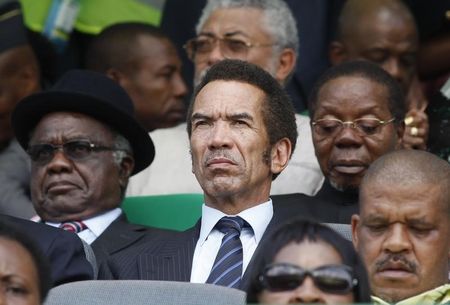By Joe Brock and Tiisetso Motsoeneng
GABORONE (Reuters) - Botswana will on Friday hold what are expected to be its closest elections since gaining independence from Britain 48 years ago as President Ian Khama's ruling party faces growing dissent in a country often heralded as a beacon of African democracy.
Khama's Botswana Democratic Party (BDP) is expected to win a reduced majority, extending the grip on power it has held since 1966. There is, however, growing support for opposition parties who say change is needed with economic growth slowing and unemployment stuck at around 20 percent.
Khama, the son of the southern African country's first president, has promised jobs and improved water and electricity output if he wins another five years in office.
Last week Botswana's sole power station broke down, forcing it to rely on electricity from neighboring South Africa.
"If you want to move forward, vote for the BDP and if you want to move backwards vote for the opposition parties," Khama told thousands of supporters at an election rally last week.
Botswana, the world's largest diamond producer and a haven for luxury safari tourism, has been one of the world's fastest growing economies since the 1970s and has remained politically stable on a continent plagued by violence and corruption.
The nation of 2 million sits third on Ibrahim Index of African Governance, behind the islands of Mauritius and Cape Verde and ahead of neighboring South Africa.
Khama's BDP are therefore trusted by large swathes of the population who have benefited from free education and generous social welfare, paid for with revenues from diamond exports.
"I believe in the president and the BDP," said Neo Phaladze, as smoke rose from the spicy sausages she grills for customers on a dusty roadside in the capital Gabarone.
"They have brought us education and helped the poor with jobs and housing. I don't see anyone else who will do that."
Economic growth, however, has slowed considerably in recent years and was just 1.6 percent in the second quarter of 2014.
Economists says Botswana is too reliant on a bloated public sector and diamond exports, which account for one-third of GDP but could dry up in the next 15 years.
Critics of Khama, a retired army general, say he has an authoritarian style, pointing to his forced evictions of bushmen out of their traditional hunting grounds in the Kalahari Desert, in what the president says is a drive to protect wildlife.
The opposition has also accused the BDP of ordering the use of violence to suppress opponents, allegations strongly denied by the party.
Some of the party's rivals described the death of charismatic politician Gomolemo Motswaledi in a car accident in July, as "suspicious" - though, again, the ruling party denied any involvement.
The media has also complained of harassment. One journalist fled to South Africa last month saying his life was in danger after writing a critical article about Khama, while his editor was briefly held by the police and data was confiscated.
"If power stays in the hands of one party for a long time, it might be dangerous," Elias Lowane, 24, a criminology graduate at the University of Botswana told Reuters.
"Who knows what the ruling party is doing to stay in power? We need a change," Lowane added.

About 824,000 registered voters will take to the polls to elect 57 lawmakers who will then choose the president. The BDP's stiffest opposition will come from the Botswana Congress Party (BCP) and the Umbrella for Democratic Change (UDC), a coalition of parties including a breakaway BDP faction.
(Writing by Joe Brock; Editing by Ed Stoddard and Andrew Heavens)
